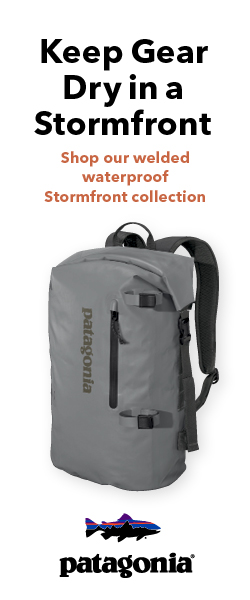
Since the launch of the original Common Threads program in 2005, Patagonia has taken back 45 tons of clothing for recycling and turned 34 tons of those returns into new clothes. With their new Common Threads Initiative Patagonia has added a new dynamic to reducing the footprint of their product, or as YC likes to call it, our stuff. There is no other company doing more to minimize its product's impact on the planet, think about the following the next time you go to make a gear or apparel purchase.
From SporstsSourceOne Media:
To help customers put back in circulation used clothes, Patagonia Inc. and eBay Inc. have joined forces to launch a new marketplace for customers to buy and sell used Patagonia gear. Patagonia's Common Threads Initiative store on eBay marks the first time a major retail brand actively encourages its customers to buy and sell used products on eBay, and it is eBay's first multi-seller branded store.
"The Common Threads Initiative addresses a significant part of today's environmental problem - the footprint of our stuff," notes Yvon Chouinard, Patagonia's founder and owner. "This program first asks customers to not buy something if they don't need it. If they do need it, we ask that they buy what will last a long time - and to repair what breaks, reuse or resell whatever they don't wear any more. And, finally, recycle whatever's truly worn out. We are the first company to ask customers to take a formal pledge and be partners in the effort to reduce consumption and keep products out of the landfill or incinerator."
A customer who lists a used Patagonia product on eBay will be asked to take the Common Threads Initiative pledge and become a partner. Membership will make the customer's listing eligible for inclusion in the Common Threads Initiative store on eBay and on Patagonia.com.
Patagonia will not receive any of the profits associated with the Common Threads Initiative storefront.
Here is a full description of the program courtesy of Patagonia's The Cleanest Line.
The new Common Threads Initiative expands on what we’ll take back for recycling. But, more importantly, it will also help you keep your Patagonia garments functioning for as long as possible and, perhaps, even keep you from buying them at all. You helped us make the original Common Threads program a success and now we’re asking you to join us once again by taking the Common Threads Pledge to reduce unnecessary consumption. Let’s see how it works.
REDUCE
We make useful gear that lasts a long time. You don’t buy what you don’t need.
We design and sell things made to last and to be useful. But we ask our customers not to buy from us what you don’t need or can’t really use. By taking the Common Threads Pledge, you “agree to buy only what I need (and will last).” Everything we make – everything anyone makes – costs the planet more life than it gives back. The biggest, first step we can all take to reduce our impact is to do more with what we have and take good care of it.
REPAIR
We help you repair your Patagonia gear. You pledge to fix what’s broken.
If a zipper fails, have it fixed, especially if the garment has a lot of life in it. For our part, we should make clothes that wear out as evenly as possible and repair quickly what you send back to us to be fixed. Our new policy is to get repairs unpacked, done and back in the mail to you within 10 business days. We pay for repairs that we’re responsible for and charge a fair price for repairs due to normal wear and tear.
REUSE
We help find a home for Patagonia gear you no longer need. You sell or pass it on to someone who needs it.
 Nothing wearable should be hoarded; useful things should be in circulation. The Common Threads Pledge asks you to reuse what you no longer need, whether you’ve given up climbing or no longer wear brown. Donate unused clothes to a charity or sell them through the new Patagonia Common Threads Initiative storefront on eBay. When you take the pledge and join the Common Threads Initiative, the used Patagonia clothing and gear you list on eBay will also be eligible for listing in the new Used Clothing & Gear section on Patagonia.com (eBay handles the purchase). Patagonia will not receive any of the profits associated with the buying or selling of used garments.
Nothing wearable should be hoarded; useful things should be in circulation. The Common Threads Pledge asks you to reuse what you no longer need, whether you’ve given up climbing or no longer wear brown. Donate unused clothes to a charity or sell them through the new Patagonia Common Threads Initiative storefront on eBay. When you take the pledge and join the Common Threads Initiative, the used Patagonia clothing and gear you list on eBay will also be eligible for listing in the new Used Clothing & Gear section on Patagonia.com (eBay handles the purchase). Patagonia will not receive any of the profits associated with the buying or selling of used garments.
RECYCLE
We will take back your Patagonia gear that is worn out. You pledge to keep it out of landfills.
Everything natural or manufactured comes to the end of its life. Everything natural gives life to something new, so should the things we make. As of today – one year behind schedule – anything you’ve ever bought from Patagonia that’s finally worn-out, you can return to us, so that we can recycle it into new fiber or fabric (or repurpose what can’t yet be recycled). There are no longer any restrictions on what Patagonia products you can return to us for recycling, and it’s still as easy as dropping the items off at your local Patagonia Retail Store or sending them to our Reno Service Center.
REIMAGINE
Together we reimagine a world where we take only what the planet can replace.
Two-thirds of our economy is based on the purchase of consumer goods. But to blindly purchase what’s good neither for the planet nor ourselves to keep the game going is the very definition of unsustainability. Let’s buy what’s healthy and useful; let’s stay away from what we don’t need and what causes unnecessary harm. Every action we take together to protect the land and waters we love adds to our knowledge and confidence that we can reimagine, then help bring about, a sustainable world for those who come after us.
Head over to Patagonia.com or eBay and take the Common Threads Pledge. Help them reach their goal of 50,000 pledges per year and gain the satisfaction that you’re doing the right thing for the planet. Together we can reduce our environmental footprint.
 Tuesday, January 31, 2012 at 12:00AM
Tuesday, January 31, 2012 at 12:00AM 
 environmental stewardship in
environmental stewardship in  Conservation,
Conservation,  Environment
Environment 






